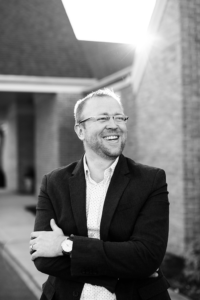This post is part of Mennonite Church USA’s MennoCon21 #BringThePeace series.
 Jon Carlson serves as Lead Pastor of Forest Hills Mennonite Church. A reluctant Millennial, Jon is fascinated by the intersections of faith, culture, technology, and tradition. He and his wife, Lyn, are raising three young children in Lancaster County, PA. When he’s not chauffeuring kids around, Jon enjoys a good cup of espresso, a dense book, or a long-distance run. Jon will speak on “Trust the Peace” during the Friday evening worship service at MennoCon21.
Jon Carlson serves as Lead Pastor of Forest Hills Mennonite Church. A reluctant Millennial, Jon is fascinated by the intersections of faith, culture, technology, and tradition. He and his wife, Lyn, are raising three young children in Lancaster County, PA. When he’s not chauffeuring kids around, Jon enjoys a good cup of espresso, a dense book, or a long-distance run. Jon will speak on “Trust the Peace” during the Friday evening worship service at MennoCon21.
_______________
Trust makes the world go ‘round — or so we’ve been taught. Trust, according to one anthropologist recounting the stories we tell about it, “is variously depicted as enhancing the social fabric, lowering crime rates, increasing happiness, promoting development, generating prosperity, improving one’s sex life, and fostering mutually beneficial relationships.”[1] In other words, if there’s anything good in the world, trust gives us more of it.
I’m not a very trusting person by nature, so I sometimes wonder whether I’m missing out on some of what’s good in the world.
I didn’t grow up in the Mennonite Church, so when I started hanging around Mennonites, I was shocked at how trusting they could be. I still remember hopping in a friend’s pickup truck after youth group and being bewildered by the fact that he not only left the doors unlocked, but he left the keys in the visor.
It wasn’t just their cars. These Mennonites I met seemed to trust each other with everything, like their homes, their money, their children, even their innermost thoughts and feelings. They worked to cultivate a trust in God so deep and abiding that they would entrust their very lives to God before they would use violence to defend themselves.
I wanted in.
But after I got in, I slowly started recognizing the shadow side of trust. For one thing, maintaining this high level of trust often made it hard to relate with strangers and outsiders. If church is the place we can trust each other with our cars and our kids, then we better be sure the church is populated by trustworthy people. Not only that, but trust sometimes seemed to mutate into control. We trusted the people who showed that they kept the rules — whether spoken or unspoken — but failing to do so could unleash a world of hurt. And trust sometimes kept our circles pretty small. We might trust one another within a single congregation, but we weren’t so sure that a congregation on the other side of town (let alone on the other side of the Mississippi) was trustworthy.
Trust may have made the church go ‘round, but sometimes it felt like we were spinning in circles.
How do we live in harmony when trust is such a tricky business?
At this summer’s convention, our Friday evening worship centers on “Trust the Peace.” I’ll be reflecting on trust: how it’s formed, why we want it, when we lose it, and what Scripture has to say about it.
The events leading up to Jesus’ execution are fraught with questions of trust and trustworthiness. Jesus is betrayed by one of his closest followers; Judas breaks trust in the most brutal way possible. Jesus’ own trust in God is weaponized against him: “He trusts in God. Let God rescue him now if he wants him” (Matthew 27:43 NRSV).
Even Jesus’ cry of dereliction on the cross — “My God, my God, why have you forsaken me?” (Matthew 27:46) — hearkens back to a Psalm of trust:
“In you our ancestors put their trust;
they trusted and you delivered them.
To you they cried out and were saved;
in you they trusted and were not put to shame.” (Psalm 22:4-5)
Ultimately, Jesus’ trust in God is vindicated in the most astonishing way possible: God proves trustworthy by raising Jesus bodily from the dead.
I’m praying that the Holy Spirit can give us the trust we need. Even if we struggle to trust each other, may we continue to trust in God and the peace God gives, believing that we won’t be put to shame.
Note:
[1] Matthew Carey in “Mistrust: An Ethnographic Theory.”

